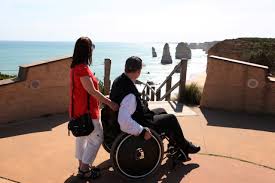Accessible tourism presents challenges in many ways for both customers and service providers alike. Movement from one location to another, accommodation, information and service provision are core elements of any tourism experience.
Some important general statistics to note around access and tourism:
- Almost one in five people has a disability
- Nearly 90 percent of people with a disability take a holiday each year
- On an overnight stay, on average, a person with a disability travels in a group of between two to eight people where they are the only member of the group with a disability
- On average, people with a disability have five trips away annually with the average length of stay being 4.98 nights away (vs 4.22 nights for non-disabled travellers).
Tourism is not just the typical Australian 7-14 night summer holiday, but rather everything from sight-seeing in one’s own home town, day trips, to 1 to 3 night ‘quick getaways.’
Changing Places toilet user Liz Ellis wrote, “Thanks to the Changing Places facilities which are now open at the Zoo, Eastland Shopping Centre, Ringwood Lakes, and the MCG. I can now enjoy a trip to the zoo to see new animals and a band at the twilight events this summer! And barrack for my football team in comfort at the MCG.”
These types of seemingly simple day trips become, at the very least, uncomfortable or impossible without the provision of accessible facilities, such as Changing Places toilets.
For many of us, it is difficult to fathom not being able to go the Zoo, or a major sporting facility because there isn’t an acceptable toilet to use, however this is the reality for many individuals in the community.
Accessible tourism is of course far more than tourism for people with disabilities. Older adults will likely have elevated access needs compared to their younger travelling companions, and in Australia, these people generally have the money to spend to ensure these needs are met.
Baby Boomers (those currently between 53 and 71 years old) make up just 25% of the Australian population, but they hold 53% of the nation’s wealth. In addition, the 65-74 age group has shown an 80% increase over the past five years on numbers holidaying overseas. Creating environments with those 50-plus in mind, presents a huge business opportunity for tourism service providers.
In his recently released biography, The Things That Make Us – Life, Loss and Football – recently retired Australian Rules Football legend Nick Riewoldt, reflects on the importance of his family holidays in Tasmania with his Nan, his Oma and Opa, his mother and father and siblings, including his beloved sister Maddie, who passed away after fighting a lengthy illness. He also of course talks about the special holidays now with his wife Cath and their own children. Generations together, all with a variety of access challenges that must be met to support and enhance a wonderful tourism experience.
